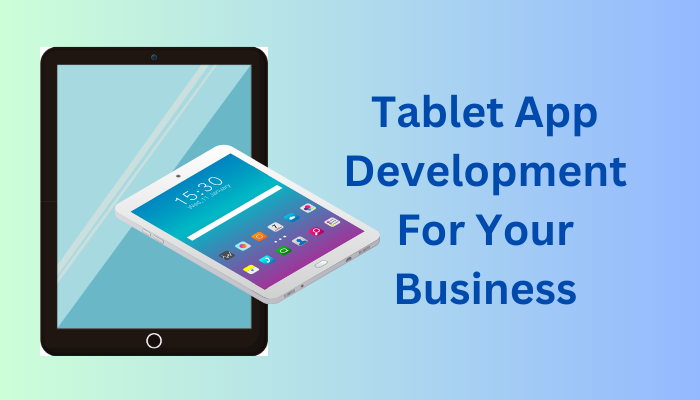Tablet computers fundamentally altered the manner in which people engage with various forms of technology. These streamlined and portable gadgets have become an essential component of our day-to-day lives because they provide a comprehensive multimedia experience and better productivity while we are on the go.
Tablet application development has emerged as a game-changer in the world of business. This has enabled businesses to simplify their processes, improve their contact with customers, and accelerate their growth.
In this article, we will investigate the factors that have led to the rise of tablet app development as the single most important factor in the competitive landscape for companies. Additionally, we will provide a complete analysis of the advantages, problems, and possible future influence of this trend.
Image by BlueWillow.ai
The Rapid Development of Tablet Computing
It is necessary to investigate the growth of tablet technology in order to comprehend the relevance of the development of tablet applications. Tablets bridge the gap between smartphones and laptops by providing a bigger screen size than phones while keeping mobility. Tablets provide a larger screen size than laptops but are still portable.
The launch of Apple’s iPad in 2010 was a watershed moment, signaling the beginning of a new era in consumer technology and ushering in a new subset of the market. Since then, a variety of manufacturers have introduced their very own tablet computers, hence increasing the number of tablet users and the need for tablet applications.
The Numerous Advantages of Developing Applications for Tablets
-
An Improved Experience for the User
Tablet application development offers a number of benefits, one of the most significant of which is the opportunity to provide an improved user experience. Tablets, with their bigger displays and more sophisticated touch capabilities, provide users with an experience that is both more immersive and participatory than that offered by smartphones or desktop computers.
Because of the additional screen real estate, app developers are now able to build user interfaces that are aesthetically attractive, have intuitive motions, and include rich information.
Tablet applications may make use of the touch interface to integrate natural movements for users, such as swiping, pinching, and tapping, which makes navigation and interaction seem more intuitive. In addition, the increased screen size makes it possible to see the material more clearly, which in turn makes it possible to show more detailed images, charts, and multimedia components.
-
The Improvement of Productivity
Applications designed for tablets have the potential to greatly increase enterprises’ levels of productivity. Tablets, because of their mobility and extended battery life, provide a flexible working environment, enabling workers to work from any location and collaborate remotely.
Tablet applications that are designed specifically for tablet app development company may be optimized in a variety of ways, including giving workers with specialized capabilities that can help expedite workflows, access real-time information, and make choices based on data.
For instance, sales teams may utilize tablet applications to access client data, handle prospects, and produce quotations while they are on the go. This eliminates the need for manual paperwork and increases sales teams’ overall productivity.
In addition, tablets may perform the functions of mobile workstations, allowing workers to access corporate systems, connect with other members of their teams, and participate in virtual meetings.
Tablet applications are very portable, which enables them to be seamlessly integrated into already established corporate processes. This gives workers the opportunity to operate more effectively and efficiently.
-
Increased Participation From Customers
Tablet applications provide a one-of-a-kind chance for companies to interact with consumers in a way that is more immersive and individualized. These applications have a variety of uses that may be put to good use to boost consumer engagement and increase revenue.
Tablet applications, for instance, may be used in retail settings as interactive catalogs or virtual showrooms, enabling consumers to browse items, examine extensive descriptions of those things, and make purchases straight from inside the application itself. This not only makes shopping more enjoyable, but it also reveals important information about the interests and actions of individual customers.
Tablet applications may also be used for interactive presentations, which gives companies the ability to demonstrate their goods or services in a manner that is both aesthetically attractive and interesting to the audience.
Businesses are able to create captivating experiences that will attract consumers and leave an impression that will remain with them for a long time if they make use of multimedia components such as films, photos, and 3D models.
-
An Advantage in the MarketPlace
Getting an early start on the creation of tablet applications might provide firms with a competitive advantage in their sector. Companies are able to distinguish themselves from their rivals, acquire new consumers, and keep the clients they already have by adopting the most recent technological developments and providing creative solutions.
Tablet applications provide companies with a platform for presenting their brand, goods, and services in a manner that is up-to-date and engaging for customers. Tablet applications that are professionally designed and easy to use exhibit a dedication to both the progression of technology and the enjoyment of customers. This may help businesses improve their reputations and the images they project of their brands.
In addition to this, applications designed for tablets might provide insightful data. Businesses are able to collect data on customer behavior, and preferences, and use trends by incorporating analytics tools into mobile applications (apps). Analyzing this data enables one to obtain a better knowledge of clients, enhance marketing techniques, and make more educated decisions.
Concerns and Things to Take Into Account
-
The Chaotic Landscape of Platform Fragments
Tablets, on the other hand, come with a wide variety of operating systems and screen sizes, in contrast to smartphones, which are controlled by Apple’s iOS and Google’s Android.
Tablet application developers have a problem as a result of the fragmentation of the tablet market since they need to assure compatibility and consistent performance across a variety of platforms and devices.
-
User Interface Design
The design of the user interface (UI) for a tablet app has to be carefully considered before android tablet app development can begin. Tablets provide users with a broader canvas on which to express their creativity; nevertheless, designing for larger displays may be difficult.
The user interface needs to be easy to understand, geared for touch interactions, and able to make the most of the capabilities of the tablet, all while giving users an experience that is stable and well-known to them.
-
Optimization of System Performance
Tablet applications need to have their performance tuned in order to guarantee that they can run smoothly despite having restricted hardware resources.
This involves effective management of available memory, rapid loading speeds, and responsiveness to actions taken by the user. while dealing with activities that need a significant amount of resources or while running the software on older tablet models, performance optimization becomes vital.
-
Safety and Personal Confidentiality
When developing software of any kind, security, and privacy are the most important factors to take into account. Tablet applications are required to safeguard sensitive user data, provide secure authentication processes, and defend against possible vulnerabilities by adhering to industry standards and best practices.
Tendencies and Prospects for the Future
-
Augmented Reality (AR) and Virtual Reality (VR)
Tablet computers are excellent platforms for augmented reality and virtual reality experiences. Tablet applications will be able to provide immersive virtual experiences as these technologies continue to progress, which will revolutionize a variety of sectors like gaming, education, and healthcare.
-
The Integration of the Internet of Things (IoT)
Tablets have the potential to act as command and control nodes for Internet of Things devices, giving customers the ability to manage their connected appliances, smart homes, and other IoT-enabled infrastructure.
Tablet applications provide consumers the ability to operate and monitor their Internet of Things ecosystems while also providing a smooth integration and an intuitive user experience.
-
Artificial Intelligence (AI) Integration
Tablets, because of the processing power and connection they provide, may make use of AI to give users tailored experiences, predictive analytics, and intelligent automation.
Tablet applications that are driven by AI may provide users with virtual assistants, recommendation systems, and data analysis tools, giving organizations the ability to make more informed choices.
Conclusion
Tablet application development has emerged as a game-changer for organizations, bringing a myriad of advantages to companies. These benefits range from higher client interaction to increased productivity and user experiences that are more satisfying.
Tablets have quickly become an essential component of our routines, and companies that recognize the importance of tablet app development will be in a better position to compete favorably in their respective markets.
However, it is essential to recognize the difficulties that are inherent in the process of designing applications for tablets. Some of these difficulties include platform fragmentation, user interface design, performance optimization, and security concerns. Having the necessary skills and attacking these difficulties with a strategic mindset are both required.
When considering the future, the creation of tablet applications offers even greater promise. New developments in technology such as augmented reality and virtual reality, the internet of things, and artificial intelligence provide companies with exciting potential to further improve their tablet app development services and remain ahead of the competition.
To make the most of the opportunities that these devices provide, companies must aggressively investigate and invest in the creation of tablet applications as tablet technology continues to advance.







Leave a Comment